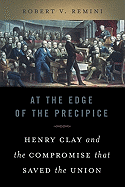
 Robert Remini paints a vivid portrait of Henry Clay in this tightly focused analysis of a critical moment in United States history. Clay was a man of enormous contradictions: he owned slaves but fought against slavery; he was one of the most popular men in the country but couldn't come close to being elected president; he was an outstanding statesman but famously lacked discipline. There was no uncertainty, however, about Clay's dedication to the idea of the country as a perpetual Union of people.
Robert Remini paints a vivid portrait of Henry Clay in this tightly focused analysis of a critical moment in United States history. Clay was a man of enormous contradictions: he owned slaves but fought against slavery; he was one of the most popular men in the country but couldn't come close to being elected president; he was an outstanding statesman but famously lacked discipline. There was no uncertainty, however, about Clay's dedication to the idea of the country as a perpetual Union of people.
Clay served in the U.S. House of Representatives (and as its Speaker) and in the U.S. Senate, in addition to being Secretary of State (1825–1828) during the administration of John Quincy Adams. His vast experience taught him that "politics is not about ideological purity or moral self-righteousness. It was about governing, and if politicians could not compromise, they could never govern effectively." His remarkable ability to bring opposing sides together during the debate about the Missouri Compromise in 1820 forever stamped him as "the Great Compromiser." That agreement may have prevented secession and civil war in the 1820s, Remini notes, but the incendiary issue of slavery and threats of secession would be ever-present over the next 40 years.
When Clay was elected to represent Kentucky in the U.S. Senate in 1849 (after he had retired from the Senate in 1842), some gentlemen representing Northern and Southern states were literally at each other's throats: a fistfight erupted in the House of Representatives; Henry Foote pulled a gun on Thomas Hart Benton in the Senate. Seeing that the country was in grave danger, Clay, at the age of 73, began to design a proposal that would again save the Union from civil war.
Professors of law counsel that every move should be strategic in negotiating an agreement, and Remini lays out the choices Clay made to sell his proposal. "All legislation, all government, all society, is formed upon the principle of mutual concession, politeness, comity, courtesy," Clay declared as he artfully persuaded his colleagues to agree on the conditions of admission of California and New Mexico as states, the boundaries of Texas, prohibition of slave-trading in the District of Columbia and other volatile issues. The tortuous process, deals brokered and ultimate resolution (not to mention the death of a president and another battle over the boundaries of Texas) become the stuff of high drama in Remini's expert telling of Clay's efforts. The success of Clay's campaign, everyone agreed at the time, prevented civil war in 1850. Senator Foote later wished that someone like Clay had been in Congress in 1860 to prevent the war that Clay helped avert for so long.--John McFarland
Shelf Talker: A finely detailed examination of the art of compromise in politics as well as a splendid testimonial to Henry Clay's inestimable value in our nation's history.

